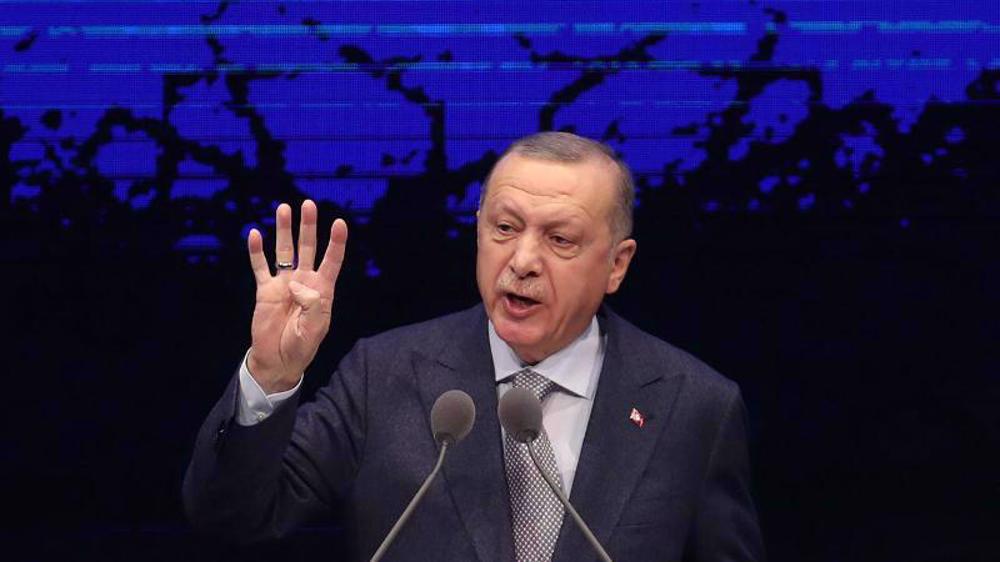Turkish MPs take oaths as Erdogan assumes sweeping new powers
Turkish lawmakers have taken oaths of office as Recep Tayyip Erdogan starts a new term as president with sweeping new powers granted in last year's narrowly-won referendum.
Members of the Turkish parliament began to take their oaths at the 600-seat legislature in Ankara on Saturday, with the process expected to end on Wednesday.
The new parliament features 295 lawmakers from Erdogan Justice and Development Party (AKP) and 49 from the allied Nationalist Movement Party (MHP).
The main opposition Republican People’s Party (CHP) won 146 seats while the pro-Kurdish Peoples' Democratic Party (HDP) exceeded the 10-percent threshold needed to enter the parliament. With 67 seats, the HDP forms the chamber's second-largest opposition faction.
The number of lawmakers has increased by 50 seats in the new Turkish parliament and thus a majority in the legislature requires 301 votes.
The new Turkish parliament speaker will be elected on Thursday, with the AKP having nominated Turkey's last prime minister Binali Yildirim for the post.
On Monday, Erdogan will be sworn in for a second term as the Turkish president. He was premier for 11 years before becoming president in 2014.
The swearing-in ceremony will take place at the parliament. Later, a ceremony will be held at the presidential complex to mark the country’s transition to the presidential system.
Erdogan secured an outright victory in the June 24 presidential polls, winning almost 52.3 percent of the votes.
Erdogan's closest rival Muharrem Ince, from the CHP, won 30.6 percent of the votes. Selahattin Demirtas, the HDP leader, came third on 8.40 percent while running from a jail cell.
In his first parliamentary speech since being re-elected, Erdogan said that he would name his cabinet on Monday, stressing that Turkey would enter a new era when he takes the presidential oath.
“As the first president of the new executive presidential system, I will announce the cabinet at 9 pm on Monday... God willing, we will hold our first cabinet meeting on Friday,” he said Saturday.
Erdogan also vowed to tackle high interest rates, inflation and a wide current account deficit, saying, “We will take our country much further by solving (these) structural problems of our economy."
In April 2017, 51 percent of Turkish voters endorsed constitutional changes backed by Erdogan, which scrapped the post of prime minister and allowed the president to select his own cabinet, regulate ministries and remove civil servants without parliamentary approval.
Supporters of the reforms argue that they will modernize the country, but opponents fear a possible authoritarian rule.
The constitutional overhaul means that Erdogan could potentially hold power until 2028.
Earlier this week, he said that his cabinet will include ministers who are not members of his party.
He further said that he may select some parliament deputies as ministers in his new cabinet, saying, “Ministers may be [selected] from the parliament as well, why not?”
In the past few years, Turkey has seen a host of terrorist attacks, most of them blamed on either the Daesh terrorist group or the Kurdistan Workers’ Party (PKK).
The country further witnessed a failed military coup in July 2016 which was blamed on US-based opposition cleric Fethullah Gulen.
Since then, Turkey has been under a state of emergency that has enabled the government to go after the media and opposition groups, believed to have played a role in the abortive putsch. More than 50,000 people have been jailed and around 160,000 civil servants sacked in the crackdown.
In a latest development on Sunday, Turkey issued a decree dismissing over 18,000 civil servants, half of them from the police force.
Almost 200 university academics and more than 5,000 armed forces' personnel were also among those fired.
Despite being a NATO member, Turkey under Erdogan has shown little interest in boosting relations with Europe and the US. Erdogan believes the EU has unfairly prevented Turkey’s bid to join the bloc.
His grievances toward the US include Washington's refusal to extradite fugitive cleric Fethullah Gulen and its support for Kurdish militants in Syria which Turkey accuses of being linked to PKK terrorists.
Further diplomatic disputes with the Europeans have nudged the country into the fold of US nemeses such as Russia and Iran.
Ankara and Washington are currently embroiled in a dispute over Turkey's plans to buy the S-400 air defense system from Russia, which have prompted the US to suspend sales of F-35 aircraft to the NATO ally.
Yemen crashes missiles, drones into American, Israeli targets
Iran’s former pres.’s martyrdom date registered in natl. calendar
Israeli prosecutor admits still can’t find October 7 'rape' victims
Qassam Brigades warns Israel will pay ‘in blood’ for its aggression
Yemeni security forces dismantle Saudi, British espionage network
VIDEO | Press TV's news headlines
Canada's PM Trudeau resigns, suspends parliament till March
France's former president Sarkozy on trial over 'Libyan case'
















 This makes it easy to access the Press TV website
This makes it easy to access the Press TV website